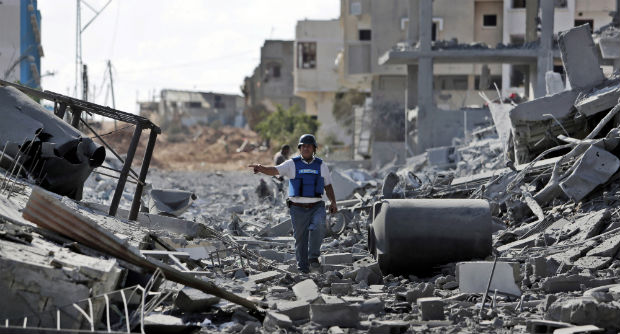Israel extends Gaza ceasefire, but Hamas resumes rocket fire

A Palestinian news assistant working with foreign media points to his family’s house which was destroyed by Israeli strikes in Beit Hanoun, northern Gaza Strip, Saturday, July 26, 2014. AP
GAZA CITY – Israel said Sunday it was extending a lull in its devastating military operation in Gaza for another 24 hours, but Hamas said it would not do likewise after resuming rocket fire at the end of mutually agreed 12-hour ceasefire on Saturday.
Israel’s cabinet “approved the UN request regarding a humanitarian ceasefire to run until midnight (2100 GMT) Sunday,” an Israeli government official told AFP on condition of anonymity late Saturday.
Hamas reacted in a statement that “no humanitarian ceasefire is valid without Israeli tanks withdrawing from the Gaza Strip and without residents being able to return to their homes and ambulances carrying bodies being able to freely move around in Gaza.”
The armed Palestinian group fired rockets at central and southern Israel immediately after the expiry of the 12-hour ceasefire Saturday both sides had abided by. Israel’s Iron Dome missile interception defenses knocked some out of the sky and no casualties were reported.
Israel’s unilateral decision to continue the ceasefire signaled a pause in its assault on Gaza which since July 8 has killed more than 1,000 Palestinians.
Over the same period, 42 Israeli soldiers deployed into Gaza have been killed, according to the latest military toll. Three civilians in Israel also died.
The deadly confrontation spurred calls from around the world for both sides to extend the ceasefire to enable negotiations for a longer-term truce.
US Secretary of State John Kerry met European and Middle Eastern foreign ministers in Paris on Saturday to push both sides to extend the temporary cessation of hostilities.
Israel agreed to extend its ceasefire for four hours, and then announced the 24-hour prolongation to late Sunday.
“We all call on parties to extend the humanitarian ceasefire,” France’s Foreign Minister Laurent Fabius told reporters in Paris after the meeting with Kerry and counterparts from Britain, Germany, Italy, Turkey and Qatar, as well as an EU representative.
A spokesman for the UN chief said in a statement Ban Ki-moon “urgently appeals once again to all parties to declare a seven-day humanitarian ceasefire in Gaza.”
Grim recovery of bodies
During Saturday’s 12-hour ceasefire, medics digging through the remains of hundreds of Gaza homes uncovered at least 147 bodies.
On the ground, Palestinian ambulances sped into Gaza neighborhoods that have been too dangerous to enter for days.
Palestinians ventured onto Gaza’s streets after the truce began, some eager to check homes they had fled, others to stock up on supplies.
In many places they found devastation: buildings leveled, entire blocks of homes wiped out by Israeli bombardment.
In northern Beit Hanun, the hospital was badly damaged by shelling, and AFP correspondents saw the charred body of a paramedic.
There were similar scenes in Shejaiya, where stiff bodies lay on the floor of a room in one building, one caked in dried blood, all of them covered in dust.
‘Humanitarian window’
East of southern Khan Yunis, residents hesitated to enter the Khuzaa neighborhood, saying Israeli forces remained inside the border area.
And in nearby Bani Suheila, where 20 people were killed in a single Israeli air strike shortly before the truce began, women and children wept as they discovered their homes destroyed.
Hamas and Israel agreed to Saturday’s “humanitarian window,” after Israel’s security cabinet on Friday night rejected a US proposal for a seven-day truce during which the two sides would negotiate a longer-term deal.
Speaking after the rejection, at a news conference in Cairo with UN chief Ban, Kerry said Israel and Hamas “still had some terminology” to agree to on a ceasefire, but added they had a “fundamental framework” on a truce.
The two sides remain at odds over the shape of a final agreement to end the fighting, however.
Hamas says any truce must include a guaranteed end to Israel’s eight-year blockade of Gaza, while in Israel there are calls for any deal to include the demilitarization of the Gaza Strip.
Huge civilian toll
The situation in Gaza has created tensions in the West Bank, where protests against Israel’s role in the conflict erupted after Friday prayers and again early Saturday, with a total of eight Palestinians shot dead by Israeli soldiers and settlers.
International concern has mounted over the civilian toll in Gaza.
Rights groups say about 80 percent of the casualties have been civilians. UNICEF, the UN agency for children, has said 192 children have been killed during the latest conflict so far.
RELATED STORIES
UN rights chief warns of possible Gaza war crimes
The Gaza Strip-Israel Wall: What it signals and symbolizes














